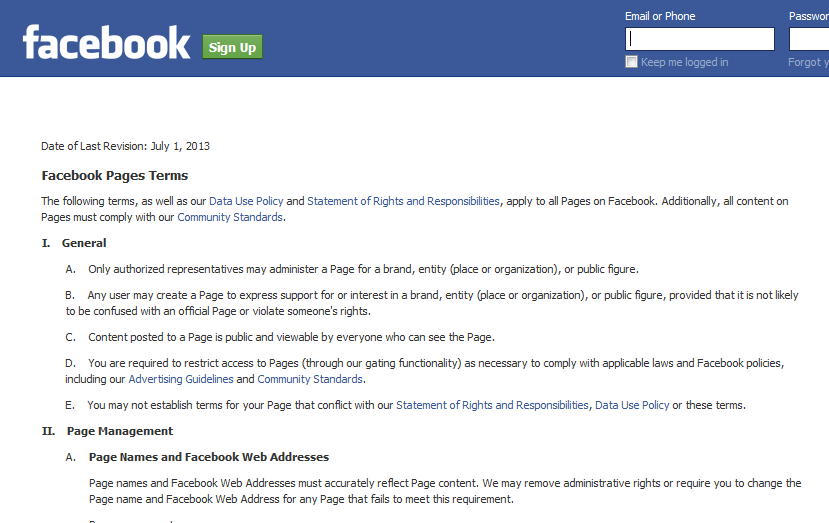Should Social Media Replace The Brand Website?
In my book Million Dollar Websites: Build a Better Website Using Best Practices of the Web Elite, I give it to the readers straight; the website should always be the ultimate destination for the brand. It has become one of the most commented sections of the book. Why? Because after drinking the Kool Aid (no disrespect, I grew up on it) marketers and brand managers have handed over the keys of the kingdom when it comes to fully realizing the return on the investment in social and often do not recognize how confining the social platform is to how their brand can engage audiences.
Despite the fact that nearly every business recognizes the need to engage in social to some level, many brands are struggling to fully realize a return on the investment in social. There are factors that contribute to this dilemma.
3 Reasons Why social media should never take the place of the website:
1. Facebook, Google+, LinkedIn, Twitter, Pinterest Are Brands Too
“Free” social platforms that society has embraced to connect on a personal and professional level were designed to make money. Facebook, as well as other social media platforms, are continually developing features to improve the user experience, most of which will serve their needs to generate specific data to support various goals and objectives.
For social platforms, it is all about aggregating users and perpetuation as much time spent on the social platform as possible. that As they mature, their revenue models evolve. However, one fact remains constant; social media platforms were created to make money, one way or another. So, if their primary goal is to serve their bottom line, why would one ever believe the best interest of brands is a priority?
Social media is most productive when implemented in the context of an integrated marketing plan, which should include a path to establishing a direct connection to each customer, promoting loyalty and supporting key performance objectives (like list-building and conversion to sales).
2. Data and User Insights
Social platforms are inherently designed to generate intelligence, data and insights that support development, advertising sales, data-mining, and licensing of data to other entities. Any marketer worth their salt understands that without proactive analysis of performance, interaction and the ability to measure results, the social media investment is subjective.
Facebook states “You will not collect users’ content or information, or otherwise access Facebook, using automated means (such as harvesting bots, robots, spiders, or scrapers) without our permission.”
In other words, you must have Facebook’s permission to build a list from the relationships you build on the platform.
Marketers know that “the money is in the list”. Those who drive interaction from social platforms to the website may enjoy greater flexibility in managing user interaction, expand exposure to the brand over time, and provide analytic reporting and insights into effectiveness of marketing efforts.
Possession is nine-tenths of the Law

When the relationship is established, cultivated and maintained on the social platform only, the relationship may be connected to the brand, but it is owned by the platform. In addition, did you know that everything you provide Facebook a non-exclusive license to distribute everything you post on your Facebook Page? Have you ever tried to export or download a “list” of fans, friends of your brand?
By leaving the relationship on the social platform, you never really take ownership of a long-term relationship. You and your customers are “permissioned” to connect with Facebook sitting in the middle, and owning the relationship. When brands invite audiences to engage on owned assets like websites and blogs, direct communication and long-term benefits are enjoyed by both sides.
3. Terms, Changes and Navigating The Unknown
A relationship with anyone on a social platform is subject to the terms and conditions, or terms of use of the platform. The ever-changing terms, display rules of profiles, posts and shares of Facebook, for example, have created ample challenge for marketers seeking to leverage the platform for their brand. As frustrated as consumers may be with the ever-changing privacy settings, brands find themselves needing to continually adapt and invest in creative and marketing to keep up with design requirements for images, tabs, and other features necessary to promoting the brand on the platform.
This has been particularly problematic for marketers in the past who wished to launch promotions on Facebook. There are guidelines to adhere to. In fact, Facebook states that promotions must be administered within the Apps on Facebook.com T a requirement that many brands may be in direct violation of.
If you use social platforms to introduce promotions, and run the promotion on the website, the benefits expand from list-building to support of key performance objectives like website visits, time on site, referrals and other factors that can directly support SEO efforts.
Facebook Page Terms Updated July 1, 2013
In May I presented a session “All Roads Lead to Home” at Nova Southeastern University for SFIMA 2013 (a South Florida Interactive Marketing Association and Pubcon conference) to articulate ten reasons why the website can, and should be, the ultimate destination for a brand and its customers. I asked the room packed full of marketers, “How many of you have read the Facebook Pages Terms of Service?” Approximately 3-5% of hands went up. I then asked, “How many have read those terms of service recently?” I think one hand went up, maybe.
Why should this matter?
On July 1,2013 Facebook updated their Facebook Pages Guidelines.
Facebook, as well as every social platform, has rules that impact how a brand can use the platform. I am focusing on this post because although many marketers continue to depend on Facebook as their sole social platform, few are staying on top of platform changes that directly impact how they interact with their audiences.
In addition to the Facebook Pages TOS, Brands must remain compliant to Facebook Ad Guidelines, Data Use Policy, Statement of Rights and Responsibilities, Facebook Platform Policies and Custom Audience Terms. Not just initially, but continually, as these guidelines tend to change frequently.
The platform is very specific about how pages can be named, populated and has offers strict guidelines on how brands may communicate, advertise and conduct promotions on the platform.
So I ask…Why let the social platform set the rules when you can use social media to engage with target audiences, and then cultivate that relationship on your own website, where you have much more freedom and flexibility?
A Fair Tradeoff?
There may be lots of eyeballs on Facebook, but they come at a price. You may be very well prepared to operate and adhere to the confines of promoting your brand on Facebook and other social platforms. However, if you haven’t considered the factors mentioned above, you may consider using social media to connect with target audiences and bring them “home” to the website.
How do you approach Facebook and the relationship between your brand and audiences? Has this post changed your thought process at all?


